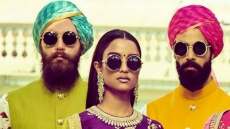This year we will be celebrating the 319th birthday of the Khalsa.
This year we will be celebrating the 319th birthday of the Khalsa. Let us explore the meaning, process and the history behind it. The usual interpretation of the word Khalsa is made as ‘Pure’ or ‘Khalis.’ Khalsa is also used for a property which belongs to the emperor directly. The official language in the Mughal era was Persian, and it contains the word ‘Khalis’ which directly translates to the word ‘Pure’ in English. On these grounds and as per the writings of the Guru Gobind Singh, the father of the Khalsa, wherein the great Guru describes the Khalsa as an army of the Akal Purakh (timeless-being), it is evident that Khalsa means timeless sovereignty.

Sikh faith developed during the start of Mughal rule led by Babar. The early Mughal emperors had a peaceful relationship with the first four Guru jis. In 1609 Guru Arjan Dev ji was persecuted by Jahangir. Subsequently, the Ninth Nanak Guru Tegh Bahadur ji was beheaded during Aurangzeb’s rule in 1675 for saving the religious rights of our Hindu brothers; at that time Guru Gobind Singh ji’s age was merely nine years.

A great day in religious history and democracy arrived on the Vaisakhi of 1699. Guru Gobind Singh addressed the congregation of about 80,000 from the entryway of a tent pitched on a hill in Anandpur Sahib. He drew his sword and asked for a head to be sacrificed. No one answered his first call, nor the second call, but on the third invitation, a person called Daya Ram (later known as Bhai Daya Singh) came forward and offered his head to the Guru. Guru Gobind Singh took him inside the tent, and emerged shortly, with blood dripping from his sword. He then demanded another head. One more volunteer came forward and entered the tent with him. The Guru again emerged with blood on his sword. This happened three more times. Then the five volunteers came out of the tent unharmed. These five, who were willing to sacrifice their lives for their Guru, were called Panj Pyare (“the five beloved ones”).

These five volunteers were:
Daya Ram (Bhai Daya Singh ji)
Dharam Das (Bhai Dharam Singh ji)
Himmat Rai (Bhai Himmat Singh Ji)
Mohkam Chand (Bhai Mohkam Singh ji)
Sahib Chand (Bhai Sahib Singh ji)

Guru Gobind Singh then took an iron bowl and poured some water in it. Sahib Devan, Guru ji’s wife added some sugar crystals (patasey) to the water, and the Guru stirred this mixture with a double-edged sword called Khanda whilst reciting the Five Banis. The resultant solution is called as the “Khande Di Pahul” (ceremony of the double-edged sword) or commonly known as “Amrit” (nectar of immortality).
Each of the Panj Pyares was given five handfuls of the Amrit to drink, and had Amrit sprinkled in their eyes five times. Each time, they repeated the phrase “Waheguru Ji Ka Khalsa, Waheguru Ji Ki Fateh.”
After this, the Guru then bowed in front of the five beloved ones to ask for the Amrit. This place is now called Takht Shri Keshgarh Sahib. This is the very first incident in religion that a Guru or a Master asks his disciples to initiate into the Order of Khalsa he created himself, indicating democracy in religion. “Waho Waho Gobind Singh ji, Apey Gur Chela”
Guru Gobind Singh gave them the title (analogous to Knight or Sir in English culture) of Singh (meaning lion). Similarly, for females the title of Kaur (meaning princess). It is noted that about 20,000 men and woman took this baptism (Amrit) on the first day.

The uniform of a Singh/Kaur of the Khalsa comprises of the Five Ks:
Kesh: Uncut hair on all parts of our body
Kanga: A wooden comb to keep our hair clean
Kara: An iron bracelet
Kachera: Special military shorts
Kirpan: A sword

These are for identification and representation of the ideals of Sikhism, such as honesty, equality, fidelity, meditating on God, never bowing to tyranny, to always stand up for helping/protecting the weak, and self-defence. The spiritual leadership is in Shabad Guru as inscribed in Shri Guru Granth Sahib ji. (Guru Granth) The temporal leadership is in the hands of Panj Pyare (Guru Panth).
The Khalsa Day (Vaisakhi) Nagar Kirtan in Surrey, British Columbia, Canada, is the largest one outside India. It is the second largest in the world. We should participate as we do every year and receive the blessings of our Guru ji. With over 45 per cent of the population of Surrey being Sikhs, the blessings of Dasmesh Pita Shri Guru Gobind Singh ji is with us in the order of saint, soldier and scholar values.
“Jo Tau Prem Khelan Ka Chao, Sir Dhar Tali Gali Mori Aao”
If you want to walk on the path of devotional love, then surrender your ego first.
“Khalsa Akal Purakh Ki Fauj, Pragtiyo Khalsa Parmatam Ki Mauj”
Khalsa is the army initiated by almighty God to protect human values.
Always strive for equality, honesty, integrity, love, forgiveness and compassion. Together we can make our city, province, country and the whole world the best place to live in peace, harmony and love.
ABOUT THE AUTHOR: Dr Pargat Singh Bhurji. MD, FRCP(C) is a consulting paediatrician in Surrey BC.
PHOTOS: Aziz Dhamani, istock, DARPAN Archives


